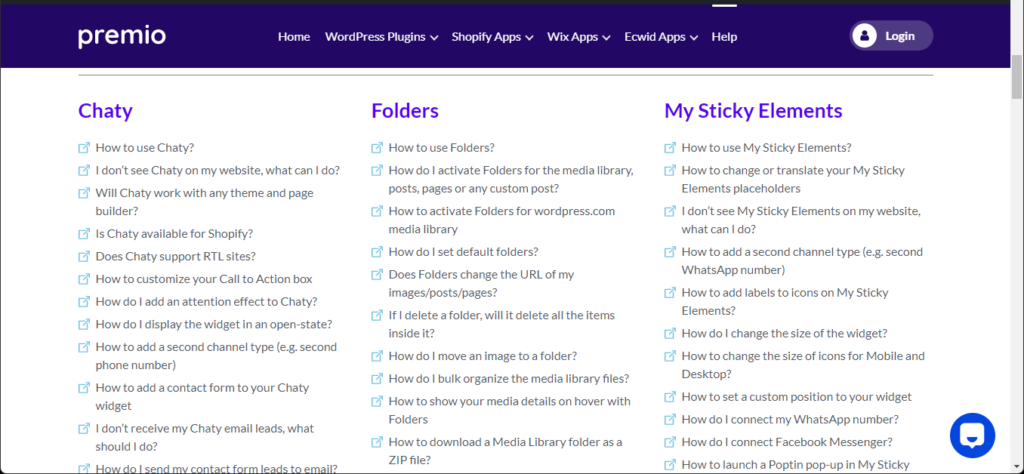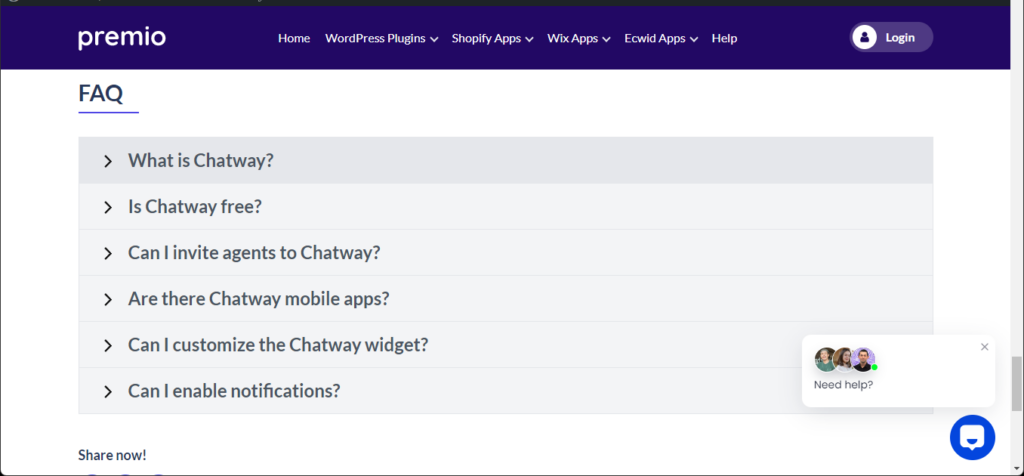Are you deciding between a knowledge base and FAQs for your business? Look no further – this article has got you covered! First things first, what are they? A knowledge base is a database of structured information that provides customers with in-depth explanations of products/service offerings. FAQs, on the other hand, are a list of common questions customers might have and their brief answers. It’s common for many companies to start with an FAQ page to help customers with their queries.

However, a more comprehensive system like a knowledge base becomes essential to offer better support options as the business grows.
So, why are these important for businesses? They serve as a customer self-help resource, reducing the influx of repetitive queries to support teams. Plus, by providing comprehensive and concise information, businesses can position themselves as industry experts. This article will explore the differences between knowledge bases and FAQs and help you make a more informed decision.
What is a Knowledge Base?
When organizing and managing information, a knowledge base is one of the most effective tools at your disposal. At its core, a knowledge base is a centralized repository of information designed to provide users with quick and easy access to answers to their queries. A knowledge base can take many forms, from a simple website with a FAQ section to a comprehensive interactive platform that includes articles, videos, and forums. No matter the format, the goal of a knowledge base is to help customers find the information they need quickly and easily.

Benefits of a Knowledge Base
The benefits of implementing a knowledge base are numerous. For one, a knowledge base can help reduce support costs by empowering customers to find the information they need independently, without contacting customer support. Additionally, a knowledge base can improve customer satisfaction by providing customers with quick and accurate answers to their questions.
Examples of Companies Utilizing a Knowledge Base
Many companies have already realized the benefits of using a knowledge base to organize information and improve customer support. For example, HubSpot has a comprehensive knowledge base, including articles, videos, and tutorials. Dropbox also has an extensive knowledge base that includes FAQs and user guides.
By providing comprehensive and easily accessible information to their users, both companies have improved customer satisfaction while reducing support costs.
In short, a knowledge base is essential for any business that wants to provide its customers with the information they need quickly and easily. By organizing information in a centralized location, businesses can reduce support costs and improve customer service, making a knowledge base a valuable investment for any business.
What are FAQs?
If you’ve ever visited a business website, you’ve encountered a Frequently Asked Questions (FAQs) page. Essentially, FAQs are a list of common customer inquiries the business has pre-answered. Providing an FAQ section on your website is an excellent way to give your customers quick and easy access to the information they need.

Benefits of FAQs
One significant benefit of FAQs is that they can save your business time and effort. By providing a list of common customer inquiries, you can avoid providing answers to the same questions repeatedly. This means you can free up valuable time to focus on other business areas.
Another benefit of FAQs is that they can increase customer satisfaction. If your customers can easily find the answer they’re looking for without calling or emailing you, they’ll be more likely to view your business positively.

Examples of Companies Utilizing FAQs
Many of the best-known companies in the world use FAQs on their websites. Take Amazon, for example. Their FAQ section is divided into different categories such as “Orders,” “Shipping,” and “Account Settings.” This lets customers quickly find the answer they want without navigating multiple pages. Keep reading if you still need to decide whether a knowledge base or FAQ section is suitable for your business. We’ll dive into the pros and cons of each approach so that you can make an informed decision.
When to Use a Knowledge Base?
A knowledge base is ideal for businesses that offer complex products or services which require detailed explanations. Customers who prefer to self-serve and access in-depth information also benefit from a knowledge base. The knowledge base is a perfect solution when a business needs to offer solutions to complex technical problems. For instance, an IT company may use a knowledge base to store technical information about a software product. In this case, the knowledge base can be used to provide a comprehensive guide to troubleshooting problems.
Additionally, a knowledge base is suitable for businesses with several products where individual customers or clients have different use cases. In such cases, a knowledge base can provide customers with various FAQs that serve a diverse audience. In other words, a business that needs to provide comprehensive and educational information to its audience can benefit from a knowledge base.
When to Use FAQs?
FAQs are a great option when your business handles common customer questions frequently. They provide a quick and easy way to access information, especially when customers are in a hurry. They are perfect for addressing queries that require short and precise explanations. For instance, a fashion retailer can use FAQs to address queries related to their shipping policies, return policies or product details.
Customers usually clearly understand what they seek, and FAQs provide quick and accessible information. If you want to save time and effort in addressing repetitive questions, FAQs are your go-to option. They allow you to focus on more important tasks while ensuring your customers quickly get the necessary information.
Pros and Cons of Knowledge Bases
Knowledge bases are a helpful tool for businesses to provide in-depth information to their customers.
Some pros of using a knowledge base include: – Easy accessibility for customers to find answers to their questions at their convenience. – Helps to reduce customer support calls and emails, which can save a business time and money. – Can be personalized to a specific business’s products and services, making it easier for customers to find relevant information.
However, there are also some cons to consider when using a knowledge base: – Creating and maintaining a knowledge base can be time-consuming and requires ongoing effort. – Some customers still prefer interacting with a live chat support representative and may feel frustrated if a knowledge base is their only option. – A poorly organized knowledge base can confuse customers, leading to negative experiences. Overall, a well-designed and presented knowledge base can be an excellent asset for a business, but it’s important to ensure that it’s meeting the needs of both the business and its customers.

Pros and Cons of FAQs
FAQs provide a quick and easy way for customers to find the answers to their questions. They are beneficial for handling common customer questions. With just a few clicks, a customer can find the information they need without waiting for a response from customer service. Additionally, FAQs are short and perfect for customers who want quick and precise information.
They also help reduce the workload on customer service representatives, allowing them to focus on more complex issues. However, FAQs may fail to offer in-depth explanations for more complex issues, leaving some customers frustrated and unsatisfied. They also require constant updating to ensure the information is accurate and up-to-date. Overall, FAQs are essential for businesses, but they should be used with a knowledge base to ensure that all customer needs are met.
Choosing the Right Option for Your Business
There is no one-size-fits-all answer when choosing between a knowledge base and FAQs for your business. Both options have pros and cons, ultimately depending on your business needs and customer preferences.
- Comparing the Pros and Cons: A knowledge base is ideal for businesses that offer complex products or services that require in-depth explanations. It also caters to customers who demand self-service options. On the other hand, FAQs are great for handling common customer questions and providing quick and accessible information.
- Considering Your Customers: When deciding between a knowledge base and FAQs, consider your customers’ preferences. Do they prefer to find answers on their own through a knowledge base, or do they prefer to have access to a list of common questions and answers through FAQs? Knowing your customers’ preferences will help you create a more personalized experience for them.
- Evaluating Your Business Needs: Evaluate your business needs to determine which option is best for you. A knowledge base may be more time-consuming to create and maintain, but it provides valuable information that can reduce customer support calls. FAQs, on the other hand, are quicker and easier to create, but they may not provide the in-depth information that customers need.
In conclusion, knowledge bases and FAQs have their place in the business world. By comparing the pros and cons, considering your customers’ preferences, and evaluating your business needs, you can make the right choice for your business. Remember, the goal is to provide your customers with the information they need in a personalized and efficient manner.
Conclusion
In conclusion, knowledge bases and FAQs are important for businesses as they give customers easy access to information. Knowledge bases are more suited for complex products and services that require in-depth explanations, while FAQs help handle common customer questions and provide quick and easy information. However, evaluating your business needs and considering your customers before choosing the right option is important.



